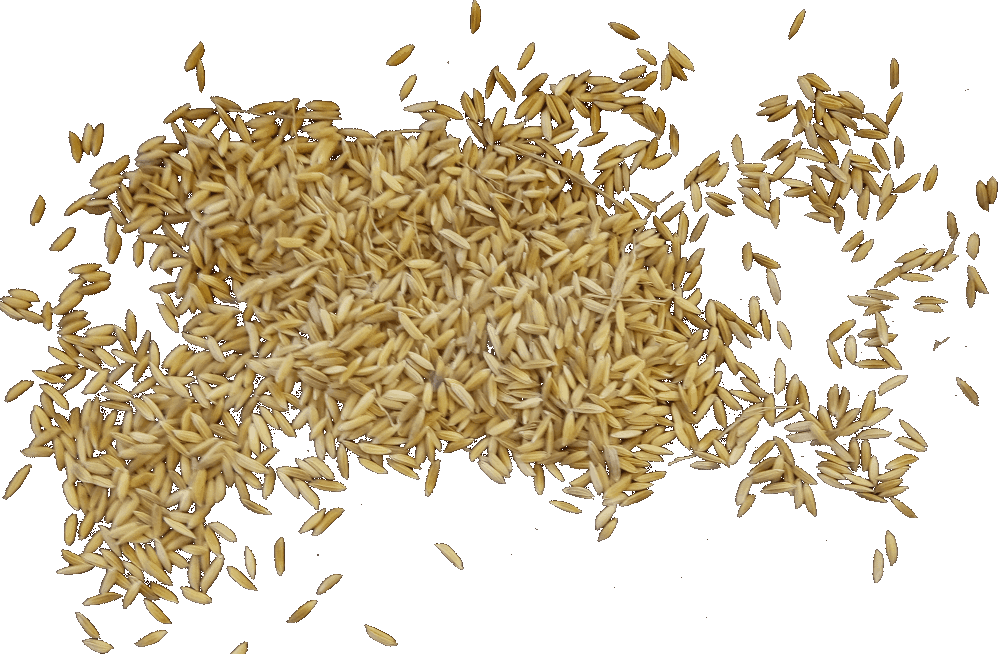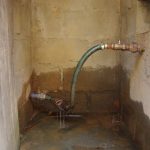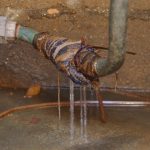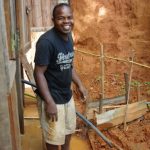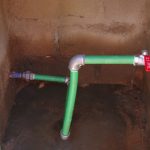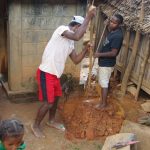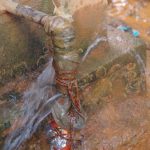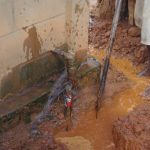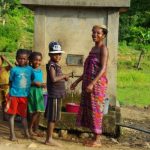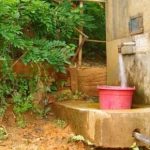30 May 2017
Several months have past since we moved to the place of our ministry: Maroamboka. We are blessed with a nice house and enough space for the children to play and to be schooled and to withdraw from daily busyness as a family.
The house is constructed mainly with wood from the nearby forests. We have a tin roof and the downstairs floor is made of concrete. We had already bought a solar-panelsystem in Tana so we even have lights during the evenings and electricity to recharge our phones and laptops. We also have a 500 litre water reservoir next to the house. This sounds like a lot but it will surprise you how much water a family of seven needs during the day. Officially we would have running water in the house. The builders connected water-pipes to the pump only 10 metres from the house. Officially? Yes, we know, that needs some explanation.
It was in the middle of the rainy season when we moved here… Only, there was no rain yet. Our water reservoir was empty and the pump was not working. We had to walk, with our jerrycans, to the nearest pump in the village only to discover that all but one stopped working. The only working pump was at the same time the one that was furthest away and not giving water on a regular base. If it gave water it was really slowww. As a consequence Jurgen had to put al the jerrycans in the car and drive to get water elsewhere. Easier said then done. To get to good water he had to drive about 5 kilometres, walk through several rice fields and climb high rocks. There he could get water from a spring. Needless to say that walking and climbing with a 20 litre jerrycan is tiresome and dangerous. Doing this will quickly help you to discover how much water you use during a day.
It was no fun for Katja and the children that Jurgen had to go to Tana for a week to get the car papers. Everybody was under strict rules concerning the use of water. Katja asked a local boy to fetch water. She payed him the same wage as water-fetchers in Tana receive. This money is a good salary in this region. The boy was motivated at first but soon he lost his motivation and he simple did not come anymore. Katja and the children needed to fetch the water themselves again. New rules: use the bare minimum during the dishes; wash yourself with maximum two measures of water; the toilet is only to be flushed by mommy or daddy and only with wastewater and so on and so forth… No fun at all!
When Jurgen came back he brought the showers with him. Torrents of rain fell down and the water reservoir filled up quickly. A brief moment without worries but what to do when the rains go away, going through the pain of hauling water again?
We started to ask about the problem left and right. Everybody in the village seemed to have his or her own truth concerning the problems of the pumps. We told the people that a village of this size (about 500 people) needed clean water to stay healthy. Yes, everybody agreed on this. We asked what they would do if the last pump broke down as well. We where astonished at their answer: “We will fetch our water from the river or get it from another village.” The water in the river is filthy, to say at least. Everywhere people dump there filth in the water and we don’t even want to start about the parasites.
Our contact person, Sylvestre, arrived back from Tana that week. He knew about the problem and told us about all the issues. It would cost quite some money to repair it. We where talking about 500.000 Ariary (give or take 150 Euro). This is a lot of money for the locals but it is doable for us.
The easiest way would be to give that money and tell Sylvestre to fix the problem. However, this is not wise as the responsibility is not ours alone. Furthermore, paying everything ourselves would establish the idea that the vazaha (white foreigner) will pay whatever problem comes up. No, we had the deal wisely with this issue. We proposed that we would pay for the materials and the villagers had to pay the plumber. We had to do this through the official channel, through the President of the Fokantany (a sort of mayor of a bigger district). Sylvestre went to talk with him, in our name. The President liked the idea and next day he arranged a big meeting in the village. Jurgen had to attend the meeting and was expected to stand next to the president.
The president clearly took the lead in the meeting! How was it possible that this problem persisted so long already? And why is it that the vazaha recognised the problem and came to him? Yes, why is it that the vazaha was more worried about the peoples health then the people themselves? Amazing that the vazaha asked questios about the problem and that knowone gave him a good answer! The president continued like this for 20 minutes, all the time Jurgen in the middle of it feeling smaller and smaller.
When the president finished his speech he told the people about our solution of paying for the materials. Big applause… But! He continued, you have to pay the plumber as it is not only the responsibility of the vazaha. But since the president expected that the people would not pay enough to fulfill their part of the agreement he came with a simple solution: A tax system of 200 Ariary (0,06 Euro-cents) per month, per family would do. The villagers agreed and that settled it.
Finally, the presidents asked Jurgen to say a few words. Jurgen explained again how important clean water is and how easy it is to get sick without. Also, one pump is clearly not enough for the whole village. Again, applause. Now the president asked Jurgen to leave as he wanted to finish the meeting.
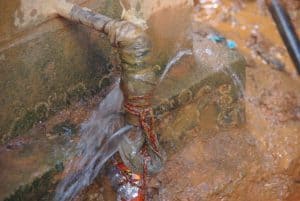 It is three months later at the moment of writing. Our contact person had to be in Tana and there he bought all the material needed for the work. And yes! In the weekend of 20/21 May we saw the plumber cycling down the road into the village. All the material was there and he started his work. To our surprise he started in the higher part of the village, located on a mountain and called Maroamboka-ambony (Maroamboka-up). We did not know that their pumps where failing as well. Systematically the plumber worked his way down. It is interesting to see how they work here. In Holland the plumbers just close the main pipe and they work with now water pressure on the pipes. A main valve is nowhere to be found here so they have to work with the water pressure on… nice and fresh in this climate!
It is three months later at the moment of writing. Our contact person had to be in Tana and there he bought all the material needed for the work. And yes! In the weekend of 20/21 May we saw the plumber cycling down the road into the village. All the material was there and he started his work. To our surprise he started in the higher part of the village, located on a mountain and called Maroamboka-ambony (Maroamboka-up). We did not know that their pumps where failing as well. Systematically the plumber worked his way down. It is interesting to see how they work here. In Holland the plumbers just close the main pipe and they work with now water pressure on the pipes. A main valve is nowhere to be found here so they have to work with the water pressure on… nice and fresh in this climate!
Meanwhile we are enjoying the water for a week already. It is nice and calm in the house as we do not have to wrestle with the jerrycans anymore. On top of that, we can use a little more water without worrying all the time. Enough water to wash, to shower and even to flush the toilet gives us more time to spend on other things. People in the village are happy as well. Everybody has a working pump near the house now. It is lovely to hear the happy noises, in the mornings and evenings; noises of people chatting while they wait their turn to was themselves or to wash their clothes. We are so happy that this problem could be solved! As said, it give us much more time to do other things. God is good!
